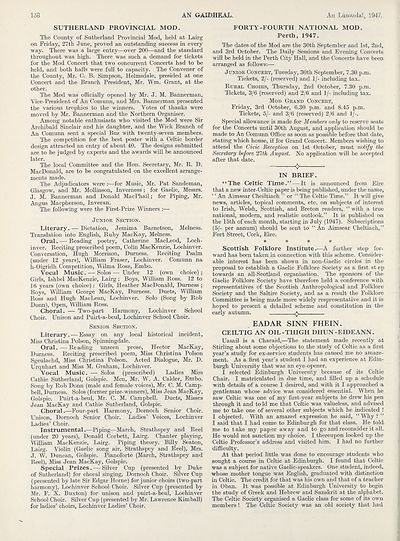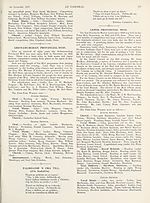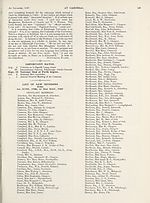An Comunn Gàidhealach Publications > Gaidheal > Volume 42, October 1946--September 1947
(146) Page 138
Download files
Complete book:
Individual page:
Thumbnail gallery: Grid view | List view

138
AN GAIDHEAL.
SUTHERLAND PROVINCIAL MOD.
The County of Sutherland Provincial Mod, held at Lairg
on Friday, 27th June, proved an outstanding success in every
way. There was a large entry—over 200—and the standard
throughout was high. There was such a demand for tickets
for the Mod Concert that two concrurent Concerts had to be
held, and both halls were full to capacity. The Convener of
the County, Mr. C. B. Simpson, Helmsdale, presided at one
Concert and the Branch President, Mr. Wm. Grant, at the
other.
The Mod was officially opened by Mr. J. M. Bannerman,
Vice-President of An Comunn, and Mrs. Bannerman presented
the various trophies to the winners. Votes of thanks were
moved by Mr. Bannerman and the Northern Organiser.
Among notable enthusiasts who visited the Mod were Sir
Archibald Sinclair and his daughter, and the Wick Branch of
An Comunn sent a special Bus with twenty-seven members.
The competition for the best poster with a Celtic border
design attracted an entry of about 40. The designs submitted
are to be judged by experts and the awards will be announced
later.
The local Committee and the Hon. Secretary, Mr. R. D.
MacDonald, are to be congratulated on the excellent arrange¬
ments made.
The Adjudicators were :—for Music, Mr. Pat Sandeman,
Glasgow, and Mr. Mollinson, Inverness; for Gaelic, Messrs.
J. M. Bannerman and Donald MacPhail; for Piping, Mr.
Angus Macpherson, Inveran.
The following were the First-Prize Winners :—
Junior Section.
Literary. — Dictation, Jemima Barnetson, Melness.
Translation into English, Ruby MacKay, Melness.
Oral. -—- Reading poetry, Catherine MacLeod, Loch-
inver. Reciting prescribed poem, Colin MacKenzie, Lochinver.
Conversation, Hugh Morrison, Durness. Reciting Psalm
(under 12 years), William Fraser, Lochinver. Comunn na
h-Oigridh Competition, Wilma Ross, Embo.
Vocal Music. — Solos—Under 12 (own choice);
Girls, Ishbel MacKenzie, Lairg; Boys, William Ross. 12 to
lb years (own choice): Girls, Heather MacDonald, Durness ;
Boys, William George MacKay, Durness. Duets, William
Ross and Hugh MacLean, Lochinver. Solo (Song by Rob
Donn), Open, William Ross.
Choral. — Two-part Harmony, Lochinver School
Choir. Unison and Puirt-a-beul, Lochinver School Choir.
Senior Section.
Literary. — Essay on any local historical incident.
Miss Christina Poison, Spinningdale.
Oral.—Reading unseen prose, Hector MacKay,
Durness. Reciting prescribed poem, Miss Christina Poison
Sgeulachd, Miss Christina Poison. Acted Dialogue, Mr. D.
Urquhart and Miss M. Graham, Lochinver.
Vocal Music. — Solos (prescribed) Ladies Miss
Cathie Sutherland, Golspie. Men, Mr. W. A. Calder, Embo.
Song by Rob Donn (male and female voices), Mr. C. M. Camp¬
bell, Durness. Solos (former prize-winners), Miss Jean MacKay,
Golspie. Puirt-a-beul, Mr. C. M. Campbell. Duets, Misses
Jean MacKay and Cathie Sutherland, Golspie.
Choral.—Four-part Harmony, Dornoch Senior Choir.
Unison, Dornoch Senior Choir. Ladies’ Voices, Lochinver
Ladies’ Choir.
Instrumental.—Piping—March, Strathspey and Reel
(under 20 years), Donald Corbett, Lairg. Chanter playing,
William MacKenzie, Lairg. Piping theory. Billy Seaton,
Lairg. Violin (Gaelic song air, Strathspey and Reel), Mrs.
J. W. Duncan, Golspie. Pianoforte (March, Strathspey and
Reel), Miss Jean MacKay, Golspie.
Special Prizes. — Silver Cup (presented by Duke
of Sutherland) for choral singing, Dornoch Choir. Silver Cup
(presented by late Sir Edgar Horne) for junior choirs (two-part
harmony), Lochinver School Choir. Silver Cup (presented by
Mr. F. X. Buxton) for unison and puirt-a-beul, Lochinver
School Choir. Silver Cup (presented by Mr. Lawrence Kimball)
for ladies’ choirs, Lochinver Ladies’ Choir.
An Lunasdal, 1947.
FORTY-FOURTH NATIONAL MOD.
Perth, 1947.
The dates of the Mod are the 30th September and 1st, 2nd,
and 3rd October. The Daily Sessions and Evening Concerts
will be held in the Perth City Hall, and the Concerts have been
arranged as follows:—
Junior Concert, Tuesday, 30th September, 7.30 p.m.
Tickets, 2/- (reserved) and 1/- including tax.
Rural Choirs, Thursday, 2nd October, 7.30 p.m.
Tickets, 3/6 (reserved) and 2/6 and 1/- including tax.
Mod Grand Concert,
Friday, 3rd October, 6.30 p.m. and 8.45 p.m.
Tickets, 5/- and 3/6 (reserved) 2/6 and 1/-.
Special allowance is made for Members only to reserve seats
for the Concerts until 30th August, and application should be
made to An Comunn Office as soon as possible before that date,
stating which house, if for Grand Concert. Members wishing to
attend the Civic Reception on 1st October, must notify the
Secretary before 21 Ih August. No application will be accepted
after that date.
$
IN BRIEF.
“The Celtic Time.” — It is announced from Eire
that a new inter-Celtic paper is being published, under the name,
‘1 An Aimsear Cheiltiach ” or “ The Celtic Time.” It will give
news, articles, topical comments, etc. on subjects of interest
to Irish, Welsh, Scottish, and Breton readers, “ with a true
national, modern, and realistic outlook.” It is published on
the 15th of each month, starting in July (1947). Subscriptions
(5/- per annum) should be sent to “An Aimsear Cheltiach,”
Fort Street, Cork, Eire.
Scottish Folklore Institute.—A further step for¬
ward has been taken in connection with this scheme. Consider¬
able interest has been shown in non-Gaelic circles in the
proposal to establish a Gaelic Folklore Society as a first st ep
towards an all-Scotland organisation. The sponsors of the
Gaelic Folklore Society have therefore held a conference with
representatives of the Scottish Anthropological and Folklore
Society and the Saltire Society, and as a result the Folklore
Committee is being made more widely respresentative and it is
hoped to present a detailed scheme and constitution in the
early autumn. <a
EADAR SINN FHEIN.
CEILTIG AN OIL-THIGH DHUN-EIDEANN.
Uasail is a Charaid,—The statement made recently at
Stirling about some objections to the study of Celtic as a first
year’s study for ex-service students has caused me no amaze¬
ment. As a first year’s student I had an experience at Edin¬
burgh University that was an eye-opener.
I selected Edinburgh University because of its Celtic
Chair. I matriculated in due time, and filled up a schedule
with details of a course I desired, and with it I approached a
gentleman whose advice was considered essential. When he
saw Celtic was one of my first-year subjects he drew his pen
through it and to Id me that Celtic was valueless, and advised
me to take one of several other subjects which he indicated !
I objected. With an amazed expression he said, “ Why ? ”
I said that I had come to Edinburgh for that class. He told
me to take my paper away and to go and reconsider it all.
He would not sanction my choice. I thereupon looked up the
Celtic Professor’s address and visited him. I had no further
difficulty.
At that period little was done to encourage students who
sought a course in Celtic at Edinburgh. I found that Celtic
was a subject for native Gaelic-speakers. One student, indeed,
whose mother tongue was English, graduated with distinction
in Celtic. The credit for that was his own and that of a teacher
in Oban. It was possible at Edinburgh University to begin
the study of Greek and Hebrew and Sanskrit at the alphabet.
The Celtic Society organised a Gaelic class for some of its own
members ! The Celtic Society was an old society that had
AN GAIDHEAL.
SUTHERLAND PROVINCIAL MOD.
The County of Sutherland Provincial Mod, held at Lairg
on Friday, 27th June, proved an outstanding success in every
way. There was a large entry—over 200—and the standard
throughout was high. There was such a demand for tickets
for the Mod Concert that two concrurent Concerts had to be
held, and both halls were full to capacity. The Convener of
the County, Mr. C. B. Simpson, Helmsdale, presided at one
Concert and the Branch President, Mr. Wm. Grant, at the
other.
The Mod was officially opened by Mr. J. M. Bannerman,
Vice-President of An Comunn, and Mrs. Bannerman presented
the various trophies to the winners. Votes of thanks were
moved by Mr. Bannerman and the Northern Organiser.
Among notable enthusiasts who visited the Mod were Sir
Archibald Sinclair and his daughter, and the Wick Branch of
An Comunn sent a special Bus with twenty-seven members.
The competition for the best poster with a Celtic border
design attracted an entry of about 40. The designs submitted
are to be judged by experts and the awards will be announced
later.
The local Committee and the Hon. Secretary, Mr. R. D.
MacDonald, are to be congratulated on the excellent arrange¬
ments made.
The Adjudicators were :—for Music, Mr. Pat Sandeman,
Glasgow, and Mr. Mollinson, Inverness; for Gaelic, Messrs.
J. M. Bannerman and Donald MacPhail; for Piping, Mr.
Angus Macpherson, Inveran.
The following were the First-Prize Winners :—
Junior Section.
Literary. — Dictation, Jemima Barnetson, Melness.
Translation into English, Ruby MacKay, Melness.
Oral. -—- Reading poetry, Catherine MacLeod, Loch-
inver. Reciting prescribed poem, Colin MacKenzie, Lochinver.
Conversation, Hugh Morrison, Durness. Reciting Psalm
(under 12 years), William Fraser, Lochinver. Comunn na
h-Oigridh Competition, Wilma Ross, Embo.
Vocal Music. — Solos—Under 12 (own choice);
Girls, Ishbel MacKenzie, Lairg; Boys, William Ross. 12 to
lb years (own choice): Girls, Heather MacDonald, Durness ;
Boys, William George MacKay, Durness. Duets, William
Ross and Hugh MacLean, Lochinver. Solo (Song by Rob
Donn), Open, William Ross.
Choral. — Two-part Harmony, Lochinver School
Choir. Unison and Puirt-a-beul, Lochinver School Choir.
Senior Section.
Literary. — Essay on any local historical incident.
Miss Christina Poison, Spinningdale.
Oral.—Reading unseen prose, Hector MacKay,
Durness. Reciting prescribed poem, Miss Christina Poison
Sgeulachd, Miss Christina Poison. Acted Dialogue, Mr. D.
Urquhart and Miss M. Graham, Lochinver.
Vocal Music. — Solos (prescribed) Ladies Miss
Cathie Sutherland, Golspie. Men, Mr. W. A. Calder, Embo.
Song by Rob Donn (male and female voices), Mr. C. M. Camp¬
bell, Durness. Solos (former prize-winners), Miss Jean MacKay,
Golspie. Puirt-a-beul, Mr. C. M. Campbell. Duets, Misses
Jean MacKay and Cathie Sutherland, Golspie.
Choral.—Four-part Harmony, Dornoch Senior Choir.
Unison, Dornoch Senior Choir. Ladies’ Voices, Lochinver
Ladies’ Choir.
Instrumental.—Piping—March, Strathspey and Reel
(under 20 years), Donald Corbett, Lairg. Chanter playing,
William MacKenzie, Lairg. Piping theory. Billy Seaton,
Lairg. Violin (Gaelic song air, Strathspey and Reel), Mrs.
J. W. Duncan, Golspie. Pianoforte (March, Strathspey and
Reel), Miss Jean MacKay, Golspie.
Special Prizes. — Silver Cup (presented by Duke
of Sutherland) for choral singing, Dornoch Choir. Silver Cup
(presented by late Sir Edgar Horne) for junior choirs (two-part
harmony), Lochinver School Choir. Silver Cup (presented by
Mr. F. X. Buxton) for unison and puirt-a-beul, Lochinver
School Choir. Silver Cup (presented by Mr. Lawrence Kimball)
for ladies’ choirs, Lochinver Ladies’ Choir.
An Lunasdal, 1947.
FORTY-FOURTH NATIONAL MOD.
Perth, 1947.
The dates of the Mod are the 30th September and 1st, 2nd,
and 3rd October. The Daily Sessions and Evening Concerts
will be held in the Perth City Hall, and the Concerts have been
arranged as follows:—
Junior Concert, Tuesday, 30th September, 7.30 p.m.
Tickets, 2/- (reserved) and 1/- including tax.
Rural Choirs, Thursday, 2nd October, 7.30 p.m.
Tickets, 3/6 (reserved) and 2/6 and 1/- including tax.
Mod Grand Concert,
Friday, 3rd October, 6.30 p.m. and 8.45 p.m.
Tickets, 5/- and 3/6 (reserved) 2/6 and 1/-.
Special allowance is made for Members only to reserve seats
for the Concerts until 30th August, and application should be
made to An Comunn Office as soon as possible before that date,
stating which house, if for Grand Concert. Members wishing to
attend the Civic Reception on 1st October, must notify the
Secretary before 21 Ih August. No application will be accepted
after that date.
$
IN BRIEF.
“The Celtic Time.” — It is announced from Eire
that a new inter-Celtic paper is being published, under the name,
‘1 An Aimsear Cheiltiach ” or “ The Celtic Time.” It will give
news, articles, topical comments, etc. on subjects of interest
to Irish, Welsh, Scottish, and Breton readers, “ with a true
national, modern, and realistic outlook.” It is published on
the 15th of each month, starting in July (1947). Subscriptions
(5/- per annum) should be sent to “An Aimsear Cheltiach,”
Fort Street, Cork, Eire.
Scottish Folklore Institute.—A further step for¬
ward has been taken in connection with this scheme. Consider¬
able interest has been shown in non-Gaelic circles in the
proposal to establish a Gaelic Folklore Society as a first st ep
towards an all-Scotland organisation. The sponsors of the
Gaelic Folklore Society have therefore held a conference with
representatives of the Scottish Anthropological and Folklore
Society and the Saltire Society, and as a result the Folklore
Committee is being made more widely respresentative and it is
hoped to present a detailed scheme and constitution in the
early autumn. <a
EADAR SINN FHEIN.
CEILTIG AN OIL-THIGH DHUN-EIDEANN.
Uasail is a Charaid,—The statement made recently at
Stirling about some objections to the study of Celtic as a first
year’s study for ex-service students has caused me no amaze¬
ment. As a first year’s student I had an experience at Edin¬
burgh University that was an eye-opener.
I selected Edinburgh University because of its Celtic
Chair. I matriculated in due time, and filled up a schedule
with details of a course I desired, and with it I approached a
gentleman whose advice was considered essential. When he
saw Celtic was one of my first-year subjects he drew his pen
through it and to Id me that Celtic was valueless, and advised
me to take one of several other subjects which he indicated !
I objected. With an amazed expression he said, “ Why ? ”
I said that I had come to Edinburgh for that class. He told
me to take my paper away and to go and reconsider it all.
He would not sanction my choice. I thereupon looked up the
Celtic Professor’s address and visited him. I had no further
difficulty.
At that period little was done to encourage students who
sought a course in Celtic at Edinburgh. I found that Celtic
was a subject for native Gaelic-speakers. One student, indeed,
whose mother tongue was English, graduated with distinction
in Celtic. The credit for that was his own and that of a teacher
in Oban. It was possible at Edinburgh University to begin
the study of Greek and Hebrew and Sanskrit at the alphabet.
The Celtic Society organised a Gaelic class for some of its own
members ! The Celtic Society was an old society that had
Set display mode to:
![]() Universal Viewer |
Universal Viewer | ![]() Mirador |
Large image | Transcription
Mirador |
Large image | Transcription
| An Comunn Gàidhealach > An Comunn Gàidhealach Publications > Gaidheal > Volume 42, October 1946--September 1947 > (146) Page 138 |
|---|
| Permanent URL | https://digital.nls.uk/125251056 |
|---|
| Description | This contains items published by An Comunn, which are not specifically Mòd-related. It includes journals, annual reports and corporate documents, policy statements, educational resources and published plays and literature. It is arranged alphabetically by title. |
|---|
| Description | A collection of over 400 items published by An Comunn Gàidhealach, the organisation which promotes Gaelic language and culture and organises the Royal National Mòd. Dating from 1891 up to the present day, the collection includes journals and newspapers, annual reports, educational materials, national Mòd programmes, published Mòd literature and music. |
|---|---|
| Additional NLS resources: |
|

